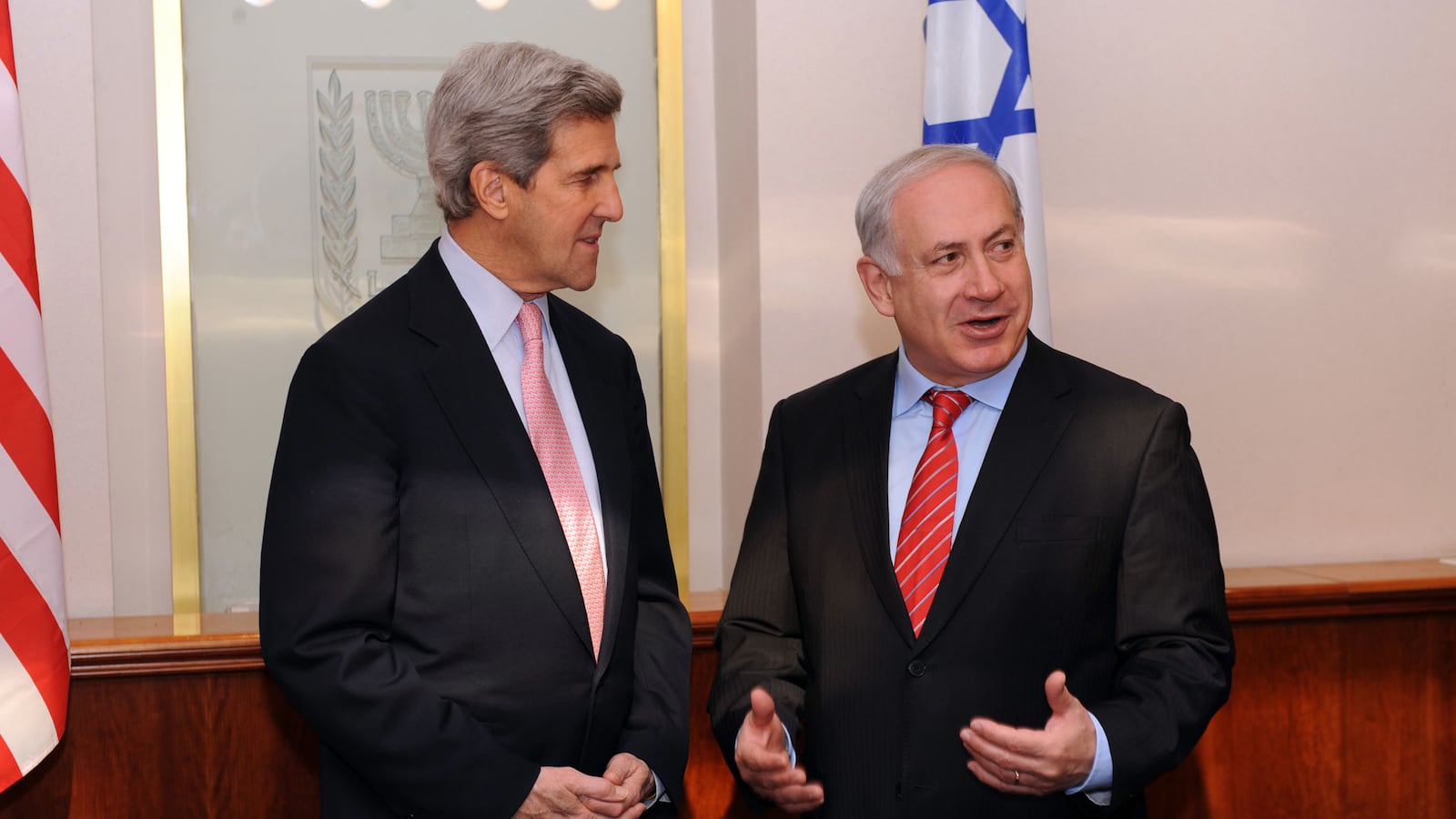John Kerry is so far not having a good run at Israeli-Palestinian peacemaking. It's not for a lack of effort: he's about to make his fourth trip of his young tenure as Secretary of State to Israel and the Palestinian territories to try to jumpstart talks. So far he seems to have done little but raise the ire of both sides—or so say a host of Israeli and Palestinian sources speaking to Haaretz reporter Barak Ravid:
One of Prime Minister Benjamin Netanyahu’s senior advisers was asked a few days ago for his opinion of Kerry’s efforts. The man responded with a smile and a wink. “The guy has a lot of energy,” he said dismissively.About one thing, there’s no disagreement between Jerusalem and Ramallah: Kerry has a lot of good intentions and a real sense of mission; he truly wants to make peace in the Middle East. But despite his good intentions, Kerry so far looks like a naive and ham-handed diplomat who has been acting like a bull in the china shop of the Israeli-Palestinian conflict. Or as former Foreign Minister Moshe Dayan once put it, he’s a good chap in the worst sense of the term.Over the last two months, Kerry has managed to upset both sides and make both more suspicious of him by a series of misguided moves and statements.

So what has Kerry done that's riled up both sides of the conflict? According to Ravid, anything and everything. Kerry said he would launch an initiative for economic growth in the Occupied Territories... and didn't tell either side in advance (never you mind that the occupation itself is the largest obstacle to Palestinian economic growth, according to the World Bank). Then there was Kerry's deadline on the feasibility of a two-state deal, upsetting the Israelis... because though it may never come, continued lip-service to a two-state solution remains essential to veiling the increasing permanence of Israeli control over the territories.
Then Kerry really stepped in it: he tried to keep Palestinian Prime Minister Salaam Fayyad from retiring, angering Fayyad and, according to Ravid's sources, forcing the moderate politician's hand. "This was Kerry’s biggest mistake," a senior Palestinian official told Ravid. "If he hadn’t intervened, Fayyad wouldn’t have resigned." Ravid is well-sourced, and I don't doubt the sincerity of contacts here, but it's hard not to view this as a counterfactual, Fayyad's tenure had been rocky from the start—it's not exactly a secret that his most staunch backers were always the Americans, certainly not his Presidential counterpart, Mahmoud Abbas, or the Palestinian electorate, which had no hand in his elevation to the post. Indeed, what held up Fayyad's actual work—trying to build up institutions and the economy—were the actions of Israel and America, namely, the continued expansion of settlements and American and Israeli attempts to strangle the Palestinian Authority's coffers (though Arab states have stepped up at times of need, they've also fell short of their commitments to the Palestinians' limited self-government). Now, Netanyahu claims to retaraining—not freezing—settlements. This week, however, his government sought to legalize three "outposts" considered illegal under even Israeli law. The settlement watchdog Peace Now aptly described it a "slap in the face to the efforts of the U.S. Secretary of State."
Kerry, Ravid reported, relies on a single adviser and smashes his way through his attempted peace processing. What Ravid doesn't mention is one of Kerry's key accomplishments so far: the rekindling of the Arab Peace Initiative. Kerry extracted a key concession from the Arab League, to recognize the need for landswaps so that the pre-1967 Green Line can be redrawn around major settlement blocs, meaning that tens of thousands of the hundreds of thousands of Israeli settlers currently in the West Bank would not have to be evacuated. From an Israeli perspective, the Arab League's peace deal just got a lot more attractive, though still flawed (see: refugee issues). Tzipi Livni, the Israeli minister working closely with Kerry to restart talks with the Palestinians, welcomed the change. But not Netanyahu. Instead, he did what he often does: moved the goalposts.
Echoing a post here on Open Zion by Dan Goldenblatt, a recent Associated Press lede captured both the stakes and Netanyahu's reaction aptly: "On the surface, the Arab League‘s improved peace initiative offers Israel everything it ever dreamed of—normal relations with an entire region that has long objected to the very existence of the Jewish state, and even the chance to keep some war-won land," the AP article said. "But two weeks after U.S. Secretary of State John Kerry persuaded Arab leaders to reissue their 2002 offer with new incentives, Israel is maintaining a striking silence, and critics are accusing Prime Minister Benjamin Netanyahu of missing a historic chance."
Kerry may be fumbling his way through trying to restart talks, but the notion that he's the one taking the parties further away from the table seems to be shooting the messenger. The tack denies the agency of Israeli and Palestinian leaders themselves, and elides scores upon scores of their own missteps. Make no mistake: Kerry's alleged ineptitude pales in comparison to the haplessness of the two principals. (The Israelis, it should be noted, hold vastly more of the power in this dynamic than the Palestinians.) Anonymously trash-talking the American Secretary of State in the Israeli press may be satisfying, but it won't win Israelis the peace they claim to crave or the Palestinians the country they say they want. It is the parties themselves who will suffer most in the absence of a deal.As Ravid mentions by highlighting the case of former U.S. Secretary of State James Baker, pressure on the parties can help get them closer, but blame for the absence of a deal rests firmly with the Israelis and Palestinians themselves. Because anonymous American officials don't plant this story in the press doesn't make it any less true.





